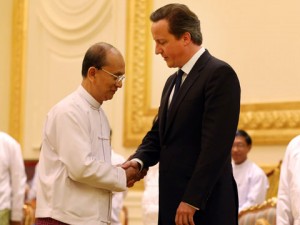Posts Tagged ‘Sanctions’ (104 found)
EU Abandons Burma’s Political Prisoners – Downgrades Human Rights
European Union members have abandoned hundreds of political prisoners and downgraded human rights as a priority in Burma, following their decision to lift all sanctions on Burma except arms.
The EU suspended sanctions on April 26th 2012, in recognition of changes that had taken place in Burma. At the time the decision to suspend the sanctions was controversial […]
• • •EU Ignores Its Burma Sanction Benchmarks
 Today, the EU is likely to lift most of the remaining sanctions on Burma allowing a glut of investment by European companies, despite the benchmarks set out last year not being met. In April last year, the EU suspended sanctions for one year and outlined conditions that must be met if they were to be lifted completely. These benchmarks included the unconditional release of political prisoners, an end to armed conflict, recognition of the status of Rohingya, and improved humanitarian access to conflict-affected zones. These conditions are being ignored.
Today, the EU is likely to lift most of the remaining sanctions on Burma allowing a glut of investment by European companies, despite the benchmarks set out last year not being met. In April last year, the EU suspended sanctions for one year and outlined conditions that must be met if they were to be lifted completely. These benchmarks included the unconditional release of political prisoners, an end to armed conflict, recognition of the status of Rohingya, and improved humanitarian access to conflict-affected zones. These conditions are being ignored.
Firstly, there remain over 200 political prisoners in Burma and those who have been released face restrictions, for example, not being issued passports. While there have been some limited steps towards the release of those remaining with the establishment of a review board to determine who is still a political prisoner and thus release them, this review board has so far lacked any substance. Furthermore, as pointed out by the Special Rapporteur for the situation of human rights in Burma, Tomás Ojea Quintana, Rohingya prisoners in Arakan State are being tortured and left out of the review board’s list of political prisoners […]
Statement on EU Review of Sanctions on Burma (3/2013)
The United Nationalities Federal Council (UNFC) urges the European Union (EU) to maintain the current level of sanctions on Burma until the Government of Burma takes further steps to demonstrate its commitment to peace, political reform, and respect for human rights […]
• • •ASEAN Parliamentarians Call on the European Union to Maintain Suspended Sanctions Against Myanmar
The European Union (EU) should renew its suspension of sanctions against Myanmar but stop short of a total lifting of restrictive measures, ASEAN Parliamentarians said today, citing serious human rights concerns and the failure of the Myanmar government to meet EU benchmarks for reform […]
• • •Joint Open Letter on Review of the European Union’s Joint Decision on Burma
Dear Minister,
We are writing to you regarding the upcoming review of the European Union’s joint decision on Burma/Myanmar and to call upon you to support the continuation of the state of suspended sanctions against Burma/Myanmar for an additional year.
While we acknowledge that positive steps have been taken by the government in Burma/Myanmar, we caution that reforms have not led to progress towards national reconciliation. Nor have they sought to stem the ongoing human rights abuses and impunity, which continue to be serious problems in the country […]
• • •Burma Briefing: The European Union Must Not Abandon Human Rights Benchmarks
The European Union is currently reviewing its policy on Burma, including whether to continue with the suspension of EU sanctions, or to lift them altogether. A final decision will be made by the Foreign Affairs Council on 22nd April.
There is no doubt that there have been dramatic changes in Burma in the past two years, and that there is opportunity for further change which must be encouraged. However, European Union members have a tendency to highlight the positives while ignoring some important and harsh realities on the ground. A careful balance needs to be struck between encouragement and continued pressure of various kinds. The European Union is not getting that balance right […]
• • •European Union Should Not Lift Sanctions On Burma
The European Union is currently reviewing its policy on sanctions on Burma. On 22nd April the EU Foreign Affairs Council will decide whether to continue the suspension of EU sanctions, or to lift sanctions. We are concerned that the premature lifting of European Union sanctions […]
• • •Statement to the Chinese Consulate, Chiang Mai
Since the resumption of conflict between the Kachin Independence Army (KIA) and the Burmese government army in June 2011, it has been the government which has been one-sidedly launching offensives for the past 19 months. This has caused over 100,000 Kachin people, including women and children, to flee their homes and seek safe shelter elsewhere […]
• • •Statement to the US Consulate, Chiang Mai
Since the resumption of conflict between the Kachin Independence Army (KIA) and the Burmese government army in June 2011, it has been the government which has been one-sidedly launching offensives for the past 19 months. This has caused over 100,000 Kachin people, including women and children, to flee their homes and seek safe shelter elsewhere […]
• • •EU Should Re-Introduce Visa Ban on Military
We, the undersigned members and observers of the European Burma Network, condemn the ongoing attacks on the Kachin people and call on the international community to put pressure on President Thein Sein and the Burmese Army to immediately end the military offensive in Northern Burma and allow access to humanitarian aid for internally displaced persons […]
• • •








 All posts
All posts